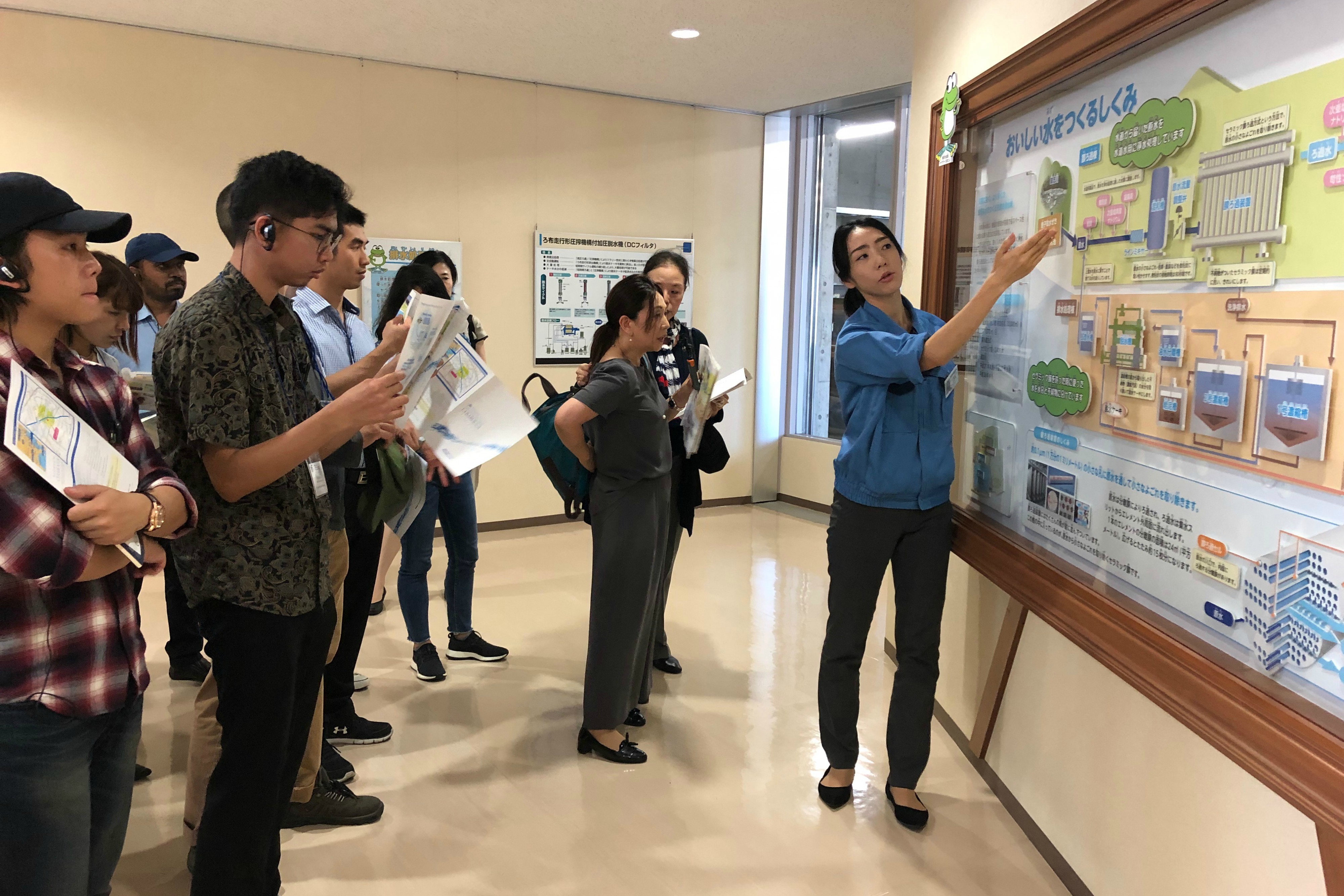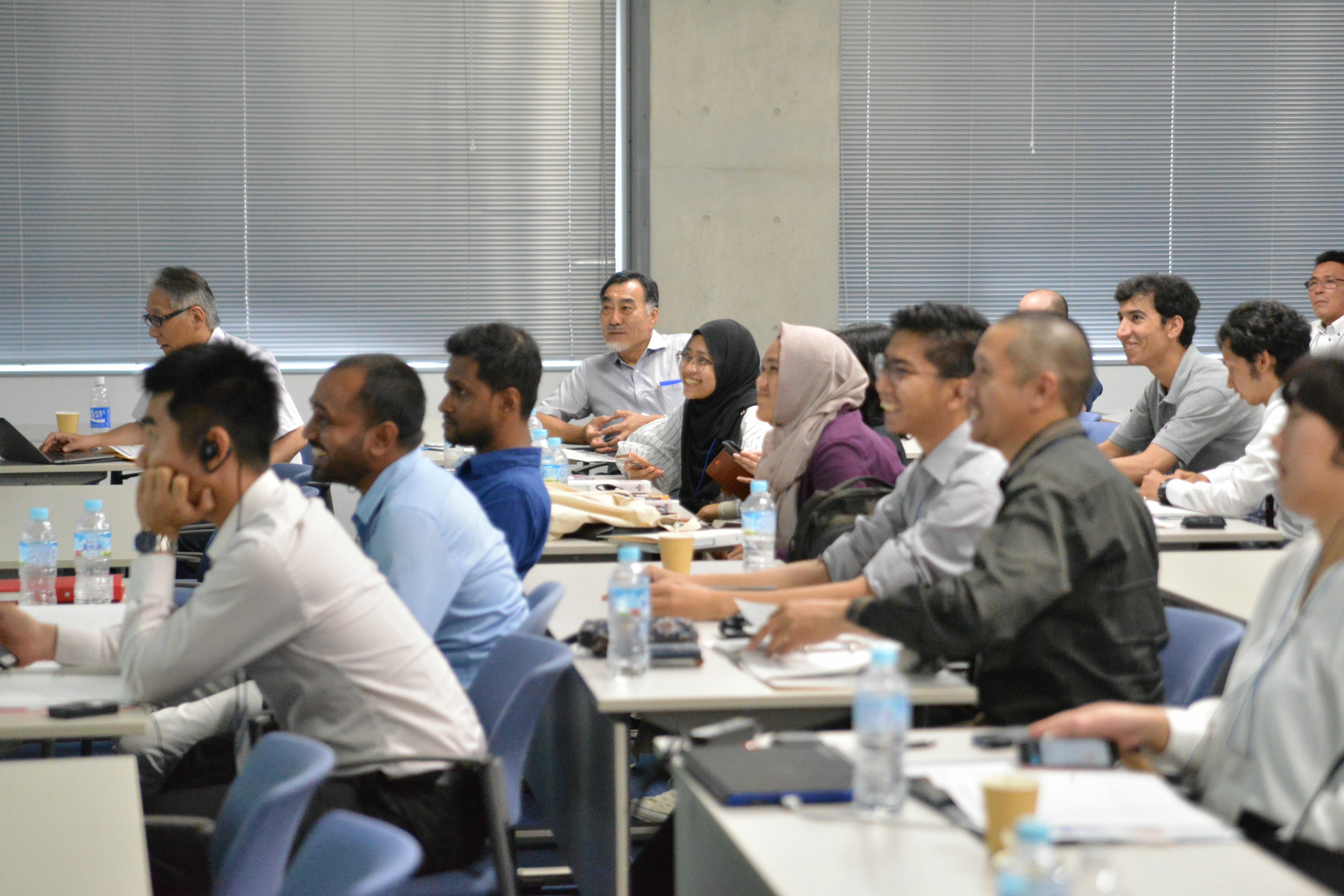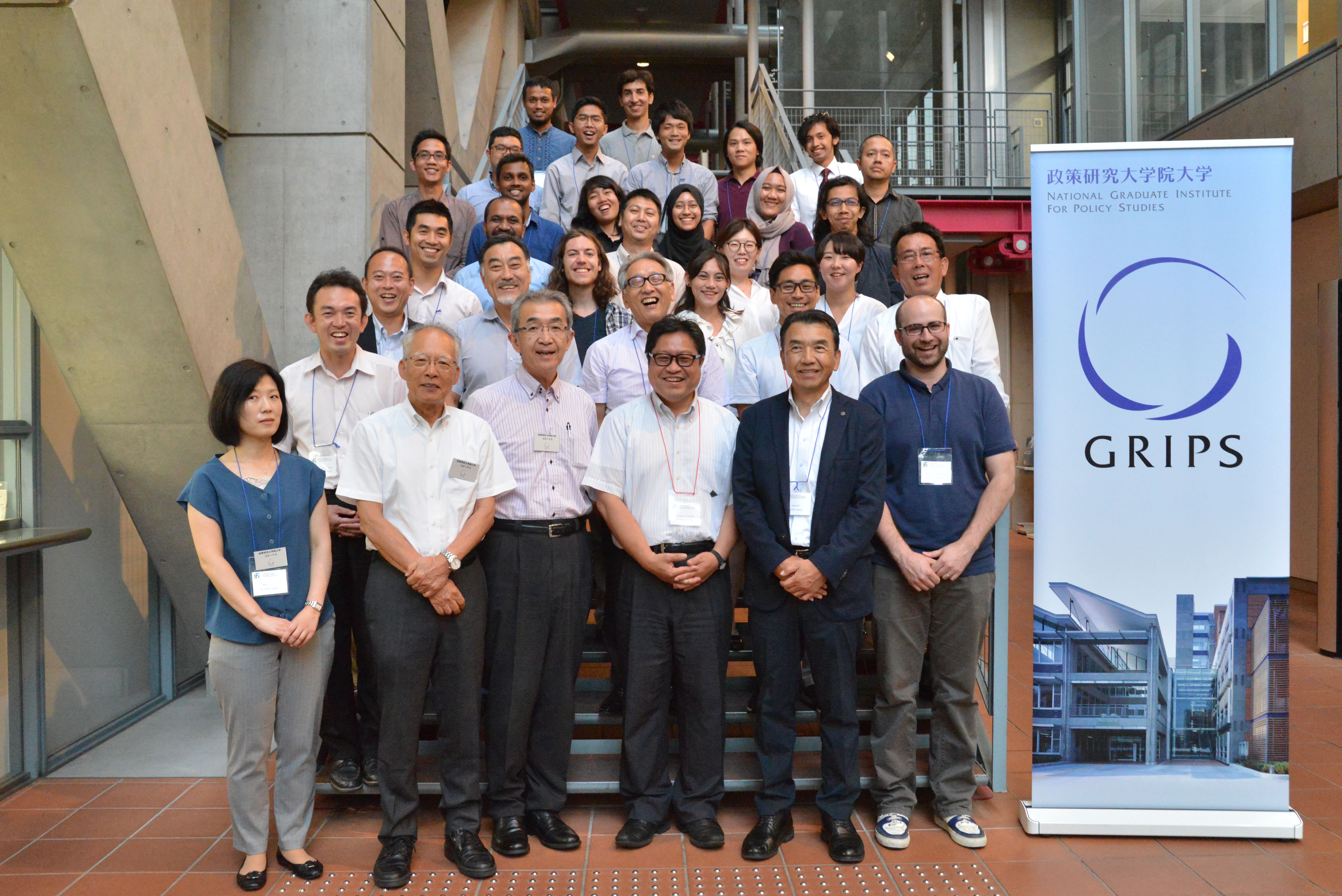The Summer Seminar for International Students “Water environment and Earth 2019″ is held by GRIPS, sponsored by METAWATER Co., Ltd., KANSEI Co., and Nippon Koei Co., Ltd in cooperation with Suntory Holdings Limited. The University of Tokyo, Japan Society of Civil Engineers and Ministry of Land, Infrastructure, Transport and Tourism support this seminar. This was the 2nd summer seminar with the theme of “Water environment and Earth”, and 22 foreign students studying at Japanese graduate schools and 1 Japanese student participated in the seminar, and the field trip and intensive lecture were held for 3 days and 2 nights from August 6, 2019 to 8.


Message from the organizer
Hitoshi Ieda
Professor
National Graduate Institute for Policy Studies(GRIPS)
The first “Summer Seminar for Foreign Students” was launched in 2014 with the theme of “Shinkansen.” This seminar program offers high-level generalist education in Japan-related topics. The program is offered through the cooperation of leading experts in infrastructure, from both academia and the private sector. To date the seminar series has been offered eight times.
One of the basic principles of the policy of this seminar is, “The seminar should focus on aspects which Japan can proudly present to the world.” In the summer of 2017, the first seminar, on the theme, “Water Environment and Earth,” featured discussion of advanced technologies related to water environment infrastructure; in the second, in summer 2019, a new theme, tsunami disaster prevention, was added. The above policy is being steadily implemented.
There are a wide range of issues related to water, and it is important that Japanese technology, knowledge and experience be widely utilized overseas by the next generation of core human resources. In order to continue to develop high-level human resource education, collaboration between industry, academia and government is essential, and I feel that our Summer Seminars have been successful in that regard.
In the future, we will continue to expand the scope of the seminar themes, and to hold seminars with the support of our industry-academia partnerships. In that way we will make a Japanese contribution to the expansion of the human network contributing to a sustainable society.
Voice of a participant
Mr. Abdul Wahid Fajar Amin
Indonesia
National Graduate Institute for Policy Studies(GRIPS)
Upon graduating from GRIPS’s master program in 2013, I learn that Japan, or GRIPS in particular, offers a unique approach in learning. GRIPS combines theoretical and practical perspectives in public policy, taught and supervised by distinguished scholars and experts. These factors have affected my decision to return to GRIPS for my PhD courses.
Currently, I am doing research on economic development in Indonesia particularly with regard to regional growth, educational improvement, and poverty alleviation. Although my research topic is not directly related to water management policy, I find several linkage of this topic with the issue of regional development.
In developing their economy, agricultural-based regions often face challenges in developing irrigation system for food crops production as well as protection from the threat of natural disaster such as drought and floods. While in poverty reduction, it is essential to improve the life of the poor especially in housing and sanitation. I find that governments still have lots of homework to integrate the issue of water management into economic development and poverty reduction policy. Governments need to reconsider the benefit of implementing partial solution in solving major challenges.
This program is beneficial for emerging countries since it provides evidence-based policy of water management in a comprehensive manner, including how to implement good governance and to manage big database. The development of flood control giant tunnel in Shizuoka is a good example how the water management system needs be inclusively designed and implemented since it also affect water utilization in drainage basin and river basin ecosystem.
In addition, the program also informed us about the development of Gesuido (sewage) pipe database using geographic information system (GIS) that cover whole Japan’s regions, and how this database can be utilized on managing and controlling Japan sewage system.
Therefore, this event, with various topics and participants, can be held regularly to share Japan experience on designing and implementing their evidence-based policy to developing and emerging countries.
Comments from Sponsor Companies
Mr. Iwao Ito
KANSEI Co., Ltd.
On the first day of the seminar, we conducted a “Delivery Class for Sewage” at our Yokohama Technology Center. After that we moved to the Pacifico Yokohama, the venue of “Sewage Works Exhibition ’19 Yokohama,” and presented the latest sewage pipe management technology in the Exhibition Hall. At GRIPS on the following day, our company representatives gave a lecture on sewage pipe management.
“Delivery Class for Sewage” is a scheme for explaining sewerage systems and the importance of their management in an easy-to-understand way suitable for overseas students. I think that the participants were able to understand the actual situation of sewerage in Japan in the lunchtime meeting, thanks to the relaxed atmosphere and the use of quizzes. We then moved to the exhibition venue, Pacifico Yokohama, and visited our company’s exhibition booth and many others. At our booth, the participants were given a briefing on pipeline work using robotics technology; they asked many relevant questions and were visibly interested.
Also on August 7, the heads of the three participating companies each gave a special lecture in which they described some aspect of the current condition of sewage systems in Japan and explained current latest-technology pipeline management in an easy-to-understand manner. The Q&A elicited many questions and dynamic discussion, and the participants seemed to have gained a deep understanding of the topic.
Mr. Hideyuki Sakunaka
Director General of Technology Headquarters
Nippon Koei Co., Ltd.
This was the second time that we offered “Water Environment and Earth,” and judging by the strong, positive participant reaction, it was a great success. This is a very well planned seminar with excellent lecturers and site visits, so it is very informative. I feel most encouraged as a corporate sponsor. The participants were not civil engineers; rather, they were young people from a wide range of fields. I hope they will remember what they learned in this seminar and find it useful as a reference when they return to their workplace and society in the near future. I strongly hope that the participants of this seminar will contribute to the realization of a sustainable society.
Mr. Takaaki Nose
Executive General Manager
Public and Investor Relations Dept.
CSR Promotion Office
METAWATER Co., Ltd.
Issues related to water and environmental infrastructure vary from country to country and region to region, but there are no fundamental differences across regions or countries, so in that sense I think these are global issues shared by all.
Through these summer seminars, overseas students will learn about the reality of Japan’s water and environmental infrastructure, and about the efforts of industry, government and academia to solve related problems.
I do hope that these seminars will give you a sense of the attitude of your colleagues who work in water– and environment–related fields.
I also hope that each of you will make contributions to the solution of water and environmental infrastructure problems in your country and region.
I find it most gratifying to be a corporate sponsor of this worthwhile project.
Comments from cooperating company
Mr. Ken Suzuki
Deputy General Manager
Corporate Sustainability Division
Suntory Holdings Limited
In this seminar, METAWATER Co., Ltd., Nippon Koei Co., Ltd. and KANSEI Co., Ltd. joined academic experts in giving a series of lectures on infrastructure, water environment and sanitation in Japan and overseas—and we provided information on groundwater recharge in forests in upstream locations. The topics—including surveys and research to clarify the current state of forests and related issues; measures to enhance forest recharge functionality; and evaluation methods—may have struck the participants as a little off-topic.
The participants asked a number of relevant questions about the method of evaluating forest functions and the monitoring and assurance of the sustainable use of groundwater. Some participants expressed a wish that the next excursion theme would be forest-related, which would allow for a field trip to a forested location.
I hope that the seminar participants gained some useful perspectives from our presentation.
Message from Chief Secretary, Water Environment and Earth Summer Seminar Committee
Takeyoshi Chibana
Associate Professor, the University of Tokyo
The seminar “Water Environment and Earth” was held for the second time on August 6th to 8th, 2019. The format was the same as in the first seminar: a tour of water and sewerage facilities and the Sewerage Works Exhibition on the first day; and lectures by researchers on business related topics by top supporting companies. The Sewerage Works Exhibition was a unique feature of this seminar, offering the opportunity to learn about the technology of various enterprises other than the sponsoring enterprises. Participating students asked questions enthusiastically at each booth and were visibly impressed by the latest water supply and sewerage technology in Japan.
In the previous seminar, in addition to topics related to water supply and sewerage, another theme was watershed management. Also, on the third day there were visits to dam, storage and infiltration facilities, and to flood control sites.
In this second seminar, the focus was on tsunami disaster prevention, so following up on the second day lecture by Professor Fumihiko Imamura (Tohoku University), on the third day the participants went to Shimizu Town and Numazu City in Shizuoka Prefecture and observed: the environs and present state of water utilization of the Kakita River; tsunami disaster prevention facilities on the coast of Suruga Bay; and the Kano River discharge channel. It was meaningful for the students, who were interested in water supply, sewerage and rivers, to be led to consider the threat sometimes posed by blessed nature and the balance of self-help, mutual assistance and public assistance needed in that regard.
Since “Water Environment and Earth” is a broad theme, the members of the executive committee have many new things to learn, so the seminar emerges as an opportunity to expand our knowledge. There are many broad and deep related topics to be explored. I would like to think about the plan for the next seminar so that foreign students from institutions all over Japan can get a bird’s-eye view of the essence of the infrastructure of this country.





